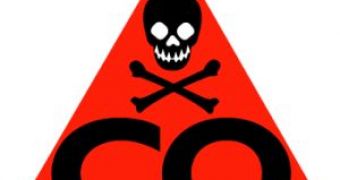Carbon monoxide is the product of an incomplete burning (a complete one produces carbon dioxide) and is regarded as extremely toxic, being the main factor of death by asphyxia in accidents provoked by stoves, house fires, generators and so on.
But researchers have proven recently that it can be sometimes life friendly.
Severe trauma, lung infection or lung disease caused by other causes may provoke ARDS, a deadly condition in which patients suffer severe shortness of breath and oxygen starvation. Even with appropriate treatment, the rate of survival is just 60-70 %.
In the US, ARDS is the number one killer of patients in intensive care unit facilities. ARDS patients are treated by offering them almost pure oxygen (95 % oxygen and 5 % carbon dioxide).
But prolonged exposure to an elevated level of oxygen (hyperoxia) is also harmful for lung cells, causing long-term injury similar to ARDS.
Carbon monoxide (CO) had been found in previous studies as a potent anti-inflammatory agent at low doses. Now researchers at University of Pittsburgh exposed cultured mice lung cells in a medium with a high concentration of oxygen, with and without low levels of CO.
CO in the hyperoxic medium significantly inhibited cell death as well as the synthesis of apoptosis (cell suicide) inducing molecules. Over 50 % of the mouse lung cells in hyperoxic media without CO made apoptosis within 72 hours, compared to about 25 % of the CO-treated cells.
"Giving ARDS patients almost pure oxygen over a prolonged period may be a double-edged sword," said lead investigator Dr. Augustine Choi, professor of medicine and the chief of the division of pulmonary, allergy and critical care medicine at the University of Pittsburgh School of Medicine.
"It saves their life in the short term, but long-term exposure appears to cause significant damage to many cell types including the epithelial and endothelial cells of the lung. However, by administering oxygen mixed with a very small amount of carbon monoxide, we may be able to significantly reduce such oxygen-associated damage and cell death."
The same team proved last year that small amounts of inhaled CO to normal individuals was not harmful for their health.

 14 DAY TRIAL //
14 DAY TRIAL //